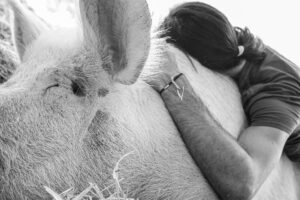
David Blatte


In the fast-paced and demanding world we live in, finding moments of stillness and calm can be challenging. In an attempt to find a little peace...
If you want to get your gut in order, Dr Will Bulsiewicz is the expert to help you sort out fact from fiction. This is the gut-health cheat sheet...
Brighten your next picnic or BBQ with these colourful rainbow rolls starring marinated baked tofu and an irresistible peanut dipping sauce. They...
This prebiotic bake is pimped up with a tangy garlic tahini drizzle. The vegetables all cook at different speeds, so some are crunchier than...
These decadent doughnuts are gluten-free, refined sugar free, and easy to make. What's not to like!
Wholefood, plant-based veggie burgers with crispy baked potato wedges: all the pleasure and comfort of the classic Aussie burger and chips, with...
Our friends at Sanitarium share this hearty and warming winter soup, fragrantly spiced and packed with the goodness of extra vegetables, toasted...
This dish is great for a light dinner and perfect for entertaining. These little skewers will have everyone asking for more!
Think mashed potatoes, but elevated. Our take on the traditional side dish features vegan sour cream, garlic, and a secret weapon that might...
Spraying sheets and pillows with calming scents can be a wonderful aid to slumber
The next time you go for a walk, discover the wonder of the everyday world around you
A skincare routine can be a way to nourish yourself inside and out
When the clouds converge, practise gratitude for the smallest of glimmers, and learn to dance in the rain.
Meat is only manly if our definition of masculinity is one of domination and outdated social norms. So why do we persist with the myth?
In the movie Escape Plan, Arnold Schwarzenegger plays an inmate of a maximum-security prison. In one scene, when he and Sylvester Stallone get into a fight, Schwarzenegger taunts him by saying, “You hit like a vegetarian!” If you’re familiar with Schwarzenegger, you’ll know his jab is tongue-in-cheek, for him if not his character. The former Mr Universe and seven-time Mr Olympia consumes an almost entirely plant-based diet (he still eats eggs). But the joke plays on a popular myth: meat is masculine.
For many, eating meat is associated with strength, health, athleticism, and sexiness. Men who don’t eat meat – vegetarians and vegans – are seen as less manly. The perception of meat as masculine may explain why vegetarian women vastly outnumber vegetarian men, in some studies by as much as two to one. Among vegans, women are represented in even greater numbers – a poll in the United States found that a whopping 80 percent are women. Men also consume over 50 percent more meat than women.
The origin of the meat is masculine myth can be traced back about two million years to when humans first started hunting animals for food, a task delegated to males. In the book Meathooked, author Marta Zaraska notes, “In hunter-gatherer societies, able hunters attract younger and more hard-working wives and tend to have more children than less successful ones.”
Over time, meat took on symbolic significance. Meat from hunting came to represent human domination over and control of nature, bestowing a sense of power and safety. The domestication of animals for food is relatively recent in human history – beginning about 10,000 years ago – and, by then, the association of meat with strength and security was already ingrained.
One characteristic of hunter-gatherer societies sheds further light on the meat is masculine myth. These societies tend to be patriarchies – where men rule. A study of over 100 cultures found that “meat-eating societies are characterised by patriarchy … plant-based societies are the most egalitarian”. In the influential book The Sexual Politics of Meat, Carol Adams draws a parallel to domination over animals. In patriarchal societies, “meat eating is associated with male power” and represents the domination of men over women. Seen this way, veganism poses a direct threat to male supremacy and masculinity itself.
The masculinity myth is perpetuated by the modern marketing of meat, which is targeted primarily at men. TV commercials routinely portray meat as sexy, using images of alluring women to make the point. A notorious Super Bowl ad for Carl’s Jr., viewed almost two million times on YouTube, features men dropping their jaws as they watch an alluring, scantily-clad woman walk through a marketplace, then bite into a big, juicy burger as she seductively eyes the camera. You could be forgiven for thinking it’s a parody, but it’s a genuine ad.
“Have you ever seen an ox eating meat?”
The fallacy that meat equals strength gained traction in the 1800s when influential chemist Justus von Liebig erroneously claimed that protein, in particular meat, is the body’s main energy source. Liebig went so far as to declare “vegetarians were theoretically incapable of prolonged exercise”. In fact, energy for exercise comes mainly from carbohydrates, not protein. Substituting protein for carbohydrates has the opposite effect, weakening the body and leading to chronic fatigue and loss of stamina. By the time this error was recognised, the misconception had already taken hold.
It wasn’t until The China Study was published in 2006 that health perceptions began to shift. The book, based on a landmark 20-year study of the diets of 6,500 people, reached a clear and ground-breaking conclusion: a plant-based diet is significantly healthier than a meat-based one. This finding has since been confirmed many times and is now widely accepted. Benefits of a plant-based diet include weight loss, lower cholesterol, greater longevity, and lower blood pressure. Plus, it also reduces the risk of heart disease, cancer, diabetes, autoimmune diseases, Alzheimer’s, osteoporosis, and other chronic illnesses. And contrary to Liebig, a well-rounded plant-based diet supplies all of the body’s protein needs.
Some of the world’s best athletes can attest to the healthiness of a plant-based diet. The number one tennis player, Novak Djokovic, proclaimed, “My diet hasn’t just changed my game, it’s changed my life, my wellbeing … When playing for three, four, five hours straight, you need the right fuel … and for me the right fuel is plant-based.” Olympic legend Carl Lewis ran his best times after adopting a plant-based diet. When Patrik Baboumian, who weightlifted 555.2 kilograms to set an official world record, was asked how he became as strong as an ox without eating meat, he replied, “Have you ever seen an ox eating meat?”
For most people, the desire for meat creates an inner conflict with their concern for animal welfare, a cognitive dissonance labelled the ‘meat-paradox’. In the study Real Men Don’t Eat (Vegetable) Quiche, psychologist Hank Rothgerber found that men and women react differently to this discomfort. The men were generally unapologetic, hesitant to acknowledge animal suffering, and hierarchical in their view toward animals. According to the study, these responses were “consistent with traditional masculine notions of strength, stoicism, and a reluctance to show weakness”. Rather than deny suffering, the women responded by dissociating the meat on their plate from the animal and avoiding thinking about the cruelty of the process.
Other studies comparing omnivores with vegans and vegetarians confirm the link between meat and traditional notions of masculinity. Meat eaters are more likely to favour hierarchies and social power – or, in other words, domination – lending strong support to Adams’s connection between meat and patriarchy and, by implication, masculinity. People who do not eat meat are more likely to respond to scenes of human and animal suffering with empathy, value equality and peace, and place greater worth on their emotions – characteristics that are commonly considered feminine.
“True strength lies in compassion and equality.”
As society moves toward greater gender equality, the lines between traditional notions of masculinity and femininity are starting to blur. But we don’t have to reformulate historical stereotypes to debunk the meat is masculine myth. Instead, we can redefine the qualities themselves. Rather than equate strength with power, we can understand that true strength lies in compassion and equality. We already know that a plant-based diet, not a meat-based one, is synonymous with health. Traditional notions of sex appeal, based on power, domination, and stoicism can be replaced with kindness, sensitivity, and care. Seen in this light, a diet free from cruelty is far sexier than one grounded in violence.

Image: Jo-Anne McArthur / Animal Equality / We Animals Media
***
The cruelty behind meat is neither masculine nor feminine. Nor is consuming it. By redefining our values, we can completely cast off the outdated meat is masculine myth. It’s a fallacy that is grounded in misguided beliefs and social conditioning. Wouldn’t it be better to encourage and celebrate those who choose a plant-based diet – whether male, female, or non-binary – for the many evidence-based reasons to do so? The result will be a kinder and more just world where everyone – human and nonhuman – is treated with respect and compassion.
Lead image: Drew Hays on Unsplash
In the fast-paced and demanding world we live in, finding moments of stillness and calm can be challenging. In an attempt to find a little peace...
If you want to get your gut in order, Dr Will Bulsiewicz is the expert to help you sort out fact from fiction. This is the gut-health cheat sheet...
Spraying sheets and pillows with calming scents can be a wonderful aid to slumber
The next time you go for a walk, discover the wonder of the everyday world around you
A skincare routine can be a way to nourish yourself inside and out
When the clouds converge, practise gratitude for the smallest of glimmers, and learn to dance in the rain.